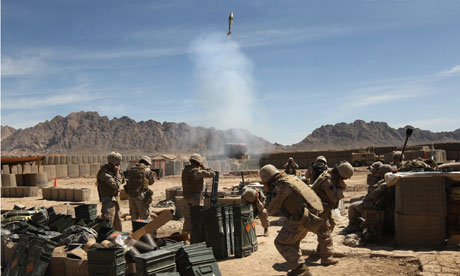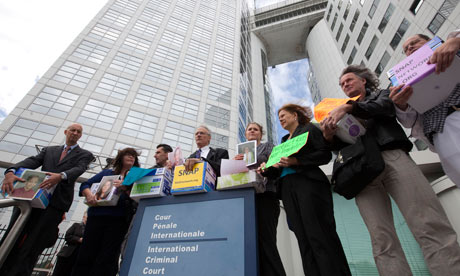
US troops fire a white phosphorous mortar towards a Taliban position on 3 April 2009 in Helmand province, Afghanistan. Photograph: John Moore/Getty
You could almost pity these people. For 67 years successive US governments have resisted calls to reform the UN security council. They've defended a system which grants five nations a veto over world affairs, reducing all others to impotent spectators. They have abused the powers and trust with which they have been vested. They have collaborated with the other four permanent members (the UK, Russia, China and France) in a colonial carve-up, through which these nations can pursue their own corrupt interests at the expense of peace and global justice.
Eighty-three times the US has exercised its veto. On 42 of these occasions it has done so to prevent Israel's treatment of the Palestinians being censured. On the last occasion, 130 nations supported the resolution but Barack Obama spiked it. Though veto powers have been used less often since the Soviet Union collapsed in 1991, the US has exercised them 14 times in the interim (in 13 cases to shield Israel), while Russia has used them nine times. Increasingly the permanent members have used the threat of a veto to prevent a resolution being discussed. They have bullied the rest of the world into silence.
Through this tyrannical dispensation – created at a time when other nations were either broken or voiceless – the great warmongers of the past 60 years remain responsible for global peace. The biggest weapons traders are tasked with global disarmament. Those who trample international law control the administration of justice.
But now, as the veto powers of two permanent members (Russia and China) obstruct its attempt to pour petrol on another Middle Eastern fire, the US suddenly decides that the system is illegitimate. Obama says: "If we end up using the UN security council not as a means of enforcing international norms and international law, but rather as a barrier … then I think people rightly are going to be pretty skeptical about the system." Well, yes.
Never have Obama or his predecessors attempted a serious reform of this system. Never have they sought to replace a corrupt global oligarchy with a democratic body. Never do they lament this injustice – until they object to the outcome. The same goes for every aspect of global governance.
Obama warned last week that Syria's use of poisoned gas "threatens to unravel the international norm against chemical weapons embraced by 189 nations". Unravelling the international norm is the US president's job.
In 1997 the US agreed to decommission the 31,000 tonnes of sarin, VX, mustard gas and other agents it possessed within 10 years. In 2007 it requested the maximum extension of the deadline permitted by the Chemical Weapons Convention – five years. Again it failed to keep its promise, and in 2012 it claimed they would be gone by 2021. Russia yesterday urged Syria to place its chemical weapons under international control. Perhaps it should press the US to do the same.
In 1998 the Clinton administration pushed a law through Congress which forbade international weapons inspectors from taking samples of chemicals in the US and allowed the president to refuse unannounced inspections. In 2002 the Bush government forced the sacking of José Maurício Bustani, the director general of the Organisation for the Prohibition of Chemical Weapons. He had committed two unforgiveable crimes: seeking a rigorous inspection of US facilities; and pressing Saddam Hussein to sign the Chemical Weapons Convention, to help prevent the war George Bush was itching to wage.
The US used millions of gallons of chemical weapons in Vietnam, Laos and Cambodia. It also used them during its destruction of Falluja in 2004, then lied about it. The Reagan government helped Saddam Hussein to wage war with Iran in the 1980s while aware that he was using nerve and mustard gas. (The Bush administration then cited this deployment as an excuse to attack Iraq, 15 years later).
Smallpox has been eliminated from the human population, but two nations – the US and Russia – insist on keeping the pathogen in cold storage. They claim their purpose is to develop defences against possible biological weapons attack, but most experts in the field consider this to be nonsense. While raising concerns about each other's possession of the disease, they have worked together to bludgeon the other members of the World Health Organisation, which have pressed them to destroy their stocks.
In 2001 the New York Times reported that, without either Congressional oversight or a declaration to the Biological Weapons Convention, "the Pentagon has built a germ factory that could make enough lethal microbes to wipe out entire cities". The Pentagon claimed the purpose was defensive but, developed in contravention of international law, it didn't look good. The Bush government also sought to destroy the Biological Weapons Convention as an effective instrument by scuttling negotiations over the verification protocol required to make it work.
Looming over all this is the great unmentionable: the cover the US provides for Israel's weapons of mass destruction. It's not just that Israel – which refuses to ratify the Chemical Weapons Convention – has used white phosphorus as a weapon in Gaza (when deployed against people, phosphorus meets the convention's definition of "any chemical which through its chemical action on life processes can cause death, temporary incapacitation or permanent harm").
It's also that, as the Washington Post points out: "Syria's chemical weapons stockpile results from a never-acknowledged gentleman's agreement in the Middle East that as long as Israel had nuclear weapons, Syria's pursuit of chemical weapons would not attract much public acknowledgement or criticism." Israel has developed its nuclear arsenal in defiance of the non-proliferation treaty, and the US supports it in defiance of its own law, which forbids the disbursement of aid to a country with unauthorised weapons of mass destruction.
As for the norms of international law, let's remind ourselves where the US stands. It remains outside the jurisdiction of the International Criminal Court, after declaring its citizens immune from prosecution. The crime of aggression it committed in Iraq – defined by the Nuremberg tribunal as "the supreme international crime" – goes not just unpunished but also unmentioned by anyone in government. The same applies to most of the subsidiary war crimes US troops committed during the invasion and occupation. Guantánamo Bay raises a finger to any notions of justice between nations.
None of this is to exonerate Bashar al-Assad's government – or its opponents – of a long series of hideous crimes, including the use of chemical weapons. Nor is it to suggest that there is an easy answer to the horrors in Syria.
But Obama's failure to be honest about his nation's record of destroying international norms and undermining international law, his myth-making about the role of the US in world affairs, and his one-sided interventions in the Middle East, all render the crisis in Syria even harder to resolve. Until there is some candour about past crimes and current injustices, until there is an effort to address the inequalities over which the US presides, everything it attempts – even if it doesn't involve guns and bombs – will stoke the cynicism and anger the president says he wants to quench.
During his first inauguration speech Barack Obama promised to "set aside childish things". We all knew what he meant. He hasn't done it.






